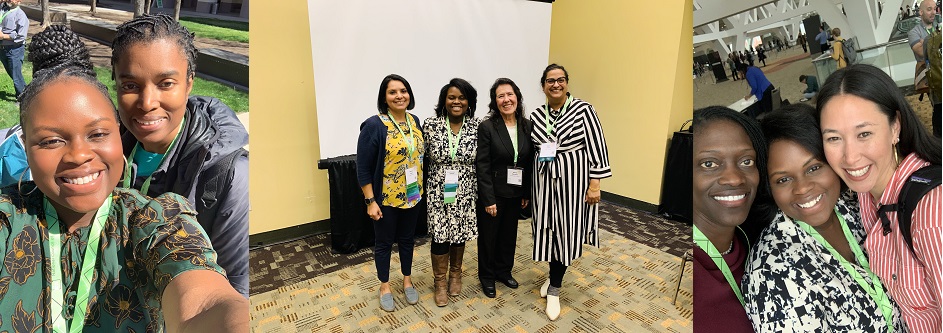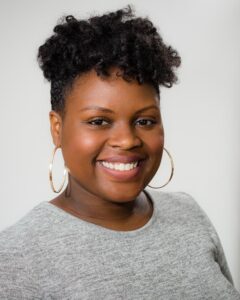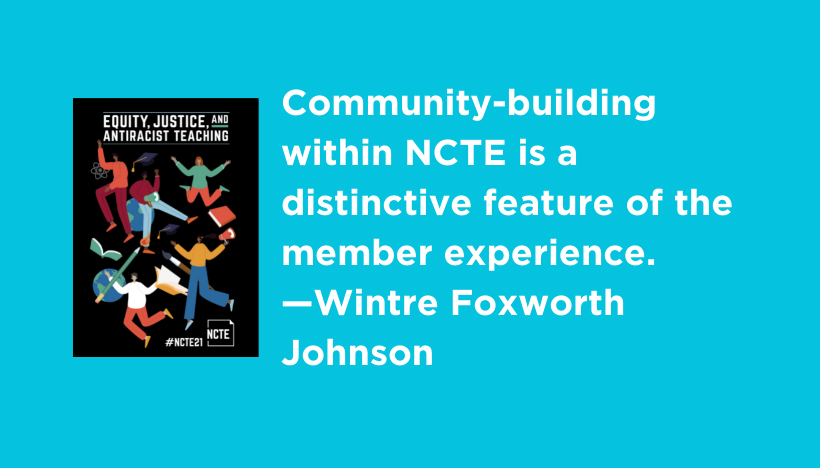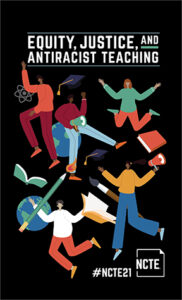This post was written by NCTE member Wintre Foxworth Johnson.
Connection. Community. Critical Reflection. My NCTE membership and attendance at Annual Conventions have afforded me the opportunity to embrace all three. Each year, I look forward to the convening of classroom teachers, researchers, teacher educators, and authors who are doing impactful work in education and seek to positively impact students in ELA classrooms across the US.
Each time I have had the chance to serve as a presenter at a Convention, I have shared space with brilliant literacy educators who are innovating the field through their interdisciplinary applications of theory and implementation of practice.

Shown from left to right: Wintre Johnson and Sonja Lanehart in Austin, Texas at a CNV Retreat; Maria Leija, Wintre Johnson, Maria Fránquiz, and Saba Vlach following a presentation at #NCTE19 in Baltimore, Maryland; Valerie Kinloch, Wintre Johnson, and Grace Player at #NCTE19.
Although we will not gather in person this year, the three Cs I mentioned can be achieved in the online platform. As I navigate the sessions, presentations, and keynotes next month, particularly with this year’s theme in mind, I will contemplate the following questions:
- Am I intentionally seeking out ways to connect to ideas and people that build me up as well as challenge me?
As a CNV fellow, I entered NCTE with a built-in family. My powerhouse cohort filled me with joy and inspiration at every retreat. My research interests and agenda were nurtured as a doctoral student by my CNV mentor Sonja Lanehart and other senior scholars like Maria Fránquiz, Susi Long, and President-Elect Valerie Kinloch. The intergenerational love and support from previous fellows like Grace Player, Tracey Flores, and Justin A. Coles was genuine. The connections were real and are enduring. NCTE is where I found “my people” in academia. Relationship building is central to the work we do as literacy educators and CNV modeled the importance of communal knowledge-building for me.
- How am I building community and kinship within the organization that will endure beyond this Convention?
Community-building within NCTE is a distinctive feature of the member experience. Walking through the Exhibit Hall, hearing the roar of voices, sifting through the vibrant array of literature and resources, meeting authors who have penned a text you cannot wait to get your hands on—all are unforgettable. This year, despite the limitations, we will build community virtually. Nevertheless, I look forward to connecting with like-minded educators who are passionately advancing the work in literacy classrooms. I intend to deepen my involvement with NCTE through membership in the Early Childhood Education Assembly and increased involvement in the Black Caucus. The communities that I have engaged in through NCTE have sustained me through my transition into the professoriate and will continue to propel me forward.
- Am I leaning in to listen to experts both within and outside my area(s) of expertise so that I might critically reflect upon and refine my teaching practice, research, and scholarship with a justice-oriented mindset?
At #NCTE19, in a powerful and energetic presentation, Jamila Lyiscott urged us to consider: “What is the capacity of marginalized literacy practices to disrupt antiblackness and whiteness within normative educational contexts?” I was moved to envisage the ways I might more explicitly center the words of the young African American children in my research and demonstrate that when we listen closely to their reflections about the world around them, it creates opportunities for their literacy engagements to be considered outside of the white gaze. The Annual Convention makes space for attendees to stretch our minds, release the constraints we place upon our scholarship, and push the boundaries of what is possible in literacy teaching and learning contexts.
My hope is that you leave #NCTE21, as I am confident that I will, with a renewed sense of purpose and commitment, motivated to improve the lives of students, with our eyes and minds toward the fight for literacy education that is not only equitable but liberatory.

Wintre Foxworth Johnson, a former NCTE Cultivating New Voices Among Scholars of Color (CNV) fellow (2018–2020), is an assistant professor in the Department of Curriculum, Instruction, and Special Education at the University of Virginia’s School of Education and Human Development. Her research has two primary aims: to examine the relationship between literacy teaching and learning in race-conscious and social justice-oriented elementary school settings and to investigate the sociopolitical development of children from historically marginalized communities, with particular focus on Black children’s racialized experiences in- and out-of-school. An article of hers will be featured in the January 2022 issue of Language Arts.
It is the policy of NCTE in all publications, including the Literacy & NCTE blog, to provide a forum for the open discussion of ideas concerning the content and the teaching of English and the language arts. Publicity accorded to any particular point of view does not imply endorsement by the Executive Committee, the Board of Directors, the staff, or the membership at large, except in announcements of policy, where such endorsement is clearly specified.
Learn more and register for the
2021 NCTE Annual Convention,
November 18-21!


